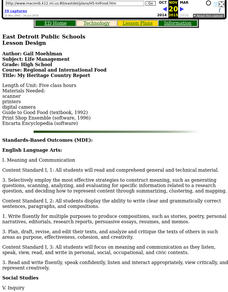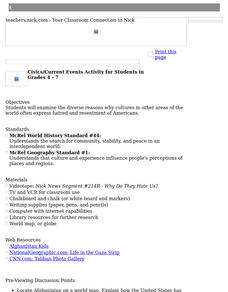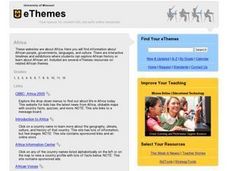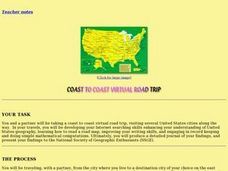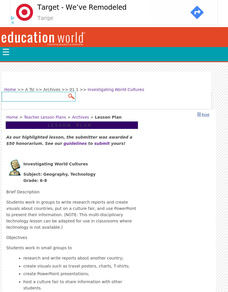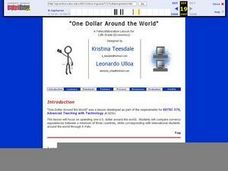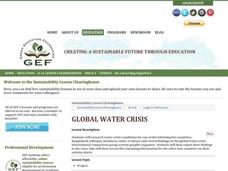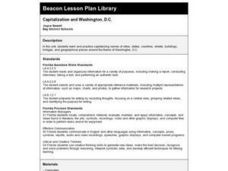Curated OER
Different Perspectives: The Durham Report and Act of Union
Young scholars research events that led to the Durham Report, the differing perspectives of various social and political groups at the time and the consequences of the report. They write a report on the source of these grievances, the...
Curated OER
Students Unlimited
Students discuss the options they have if they want to participate and help others. They work with others to develop a community service project. They work with other students in other countries to help them get started as well.
Curated OER
My Heritage Country Report
Students list five food dishes that are part of their family's heritage. Each student then does research of a country and a recipe (possibly a family recipe). With the help of members of his/her kitchen group, the student prepares the dish.
Curated OER
Refugees' Experiences in Countries of Asylum: "What's in a name"?
Ninth graders examine the term stereotype. In this Current Events lesson, 9th graders analyze posters on racism. Students watch news reports on racism and stereotyping.
Curated OER
Civics/Current Events Activity for Students in Grades 4 - 7
Students examine the diverse reasons why cultures in other areas of the world often express hatred and resentment of Americans.
Curated OER
Country: Africa
Young scholars access a variety of Africa themed websites. They locate information about African people, governments, languages and culture. They interact with timelines and explore African history or art.
Curated OER
Coast to Coast Virtual Trip
Students complete a variety of exercises and activities as they plan a coast to coast trip across America. They keep a journal that includes where they went, what they did, what they saw, etc. They compare two cities they visited along...
Curated OER
Money Matters: The Importance of Global Cooperation
Students prepare for a visit to the International Monetary Fund (IMF). In this instructional activity students create a concept map of money. They discuss the goals of the IMF. Students research countries currently changing into market...
Curated OER
Slavery and the Underground Railroad
Third graders discover racism in our country by investigating the Internet. In this abolitionist movement lesson, 3rd graders define the Underground Railroad and participate in an activity by logging on to an on-line History...
Curated OER
Investigating World Cultures
Students, in groups, write research reports and create visuals about countries, put on a culture fair, and use PowerPoint to present their information.
Curated OER
Telecommunications and the Whole Language Program
Young writers use technology and other media to research information on a chosen topic. They explore countries where keypals and e-mail friends are located. Using their writing skills, they correspond with their e-mail friend and...
Curated OER
Changing Borders
Students explain that the boundaries between countries are not permanent, then analyze current events and stories as examples of cooperation and conflict. They describe a place using physical and human characteristics.
Curated OER
One Dollar Around the World
Twelfth graders collaborate via ePals with another student from another country. They compare the value of a dollar with its power of acquisition in other countries. They list one dollar items and find the corresponding price in other...
Curated OER
I Wonder Where The Manduca Came From...
Learners examine how the Manduca came to America the economic means that made it possible. They discover what frass is and make observations. They make their own speculations on why the Manduca came to America.
Curated OER
World Hunger - A Cultural Crisis
Learners explore the problem of world hunger and starvation. After a class discussion, students use a map to identify specific areas where populations are starving. In groups, learners research reasons for the lack of food. They prepare...
Curated OER
Passport to the Eastern Hemisphere
Seventh graders explore the Eastern Hemisphere. They investigate the customs, currency, climate, location and other facts needed in order to travel to a specific country. Students receive a stamp on their "passport" when their research...
Curated OER
Global Water Crisis
Assign ecologists one of five countries that struggle with access to clean water. They research the water crisis in that country and then present information to classmates. A handout was designed for each country, and a worksheet on...
Curated OER
What in Our World Affects the Way People Live
Sixth graders study various maps that show geographical features and population. They compare the maps and make inferences about how various geographical features influence the population and human activities of an area.
Curated OER
Discovering Math Concepts in Business Mathematics, Economics, and Finance
Explore the concept of money and research its origin. There are many concepts related to business math, thusly, there are many formulas used to make calculations around money. Exchange rates of money in different countries, interest,...
Curated OER
Spice Up Your Life
Second graders identify major spices found in the world. They link spices with countries they are grown in and the uses for these valuable items.
Curated OER
Capitalization and Washington, D.C.
Second graders learn and practice capitalizing names of cities, states, countries, streets, buildings, bridges, and geographical places around the theme of Washington, D.C. through activities at learning centers in the classroom.
Curated OER
Title: Rivers as Borders
Pupils are introduced to the concept of borders. They read maps and identify rivers that separate different countries and states. They examine how or why a landform such as a river border might be the reason for different cultures.
Curated OER
Wow! You're Eating Geography
Students examine patterns of food producing areas, and identify foods that are grown locally, in the U.S., and around the world. They map and graph the major food crops of their local area, the U.S., and other countries, and discuss the...
Curated OER
Garb and Grub Across the Globe
First graders discuss what part of the world their ancestors came from. They locate the locations on a map and discuss the differences and similarities of each continent and their people. They become familiar with the traditional...




